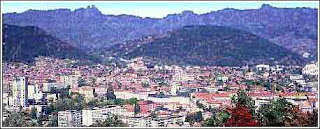I see that rule of law has not improved in Azerbaijan since I worked and lived in Baku between 2003-05. Those attending the Eurovision Song contest being held there in a couple of months should be told about the evictions which have taken place to house the stupid event. I went to work there (for 2 years) immediately after I had spent 3 years in Uzbekistan, For me, the repressive nature of the regimes which ruled the 2 countries was so similar - but the oil and geography ensured that Azerbaijan remained a Western favourite while Uzbekistan was increasingly demonised. These evictions are just a very public example of the way the authorities in that country trample all over its citizens' basic rights.
A good vignette about professionals
Sometimes you find real gems in discussions threads. Here's a great comment on the legal system from someone whose name I didn't note in a now-forgotten discussion thread. It could be used of any professional system -
I am reminded, as I read this, of the historical critique - The Third Revolution; professional elites in the modern world by Harold Perkins which I have referred to several times on this blog. And who better than Daumier to offer a graphic comment on the legal profession! Here is a wonderful video on the Daumier caricatures.Judges, lawyers, barristers and other professional morality men work consciously and unconsciously to create unnecessary needs and ensure that there is no other means of meeting them than through their profession. This they do in five ways.
• Firstly, they make truth, justice and authority inseparable from an abstract and extremely complicated code that only they are trained to understand. In this they are no different from scientists, doctors or politicians; or from the priests they took over from, who, before printing and wide-literacy, had sole access to the word of God.
• Secondly, and connected with their abstraction of truth, they create and use a nomenclature, or jargon, to describe both their own activity as well as normal life. Laws are couched in such obscure language that only those who have spent years learning the code are able to interpret and discuss them.
• Thirdly, going to court involves a series of ceremonial, formalised rituals, invested with all the mystique of a religion, that bewilder, terrify or pacify outsiders into further dependence and unnecessary “respect”.
• Fourthly, there is little and usually no provision for the independent litigant to represent herself. She is given little or no help or encouragement to defend her case. She is unprofessional, and so is treated, by judges and lawyers alike, as incompetent, untrustworthy and irresponsible. Witnesses are treated in a similar way: only professionals can give opinions; everyone else must stick to facts.
• Finally, “nobody is above the law.” This demonstrable lie ensures that justice cannot be done outside of court. This does not just include legal disputes, crime and so forth, but also marriage, divorce, buying a house and making a will, all of which are invalid without a trip to the lawyer.
Bulgarian caricaturists such as Ilya Beshkov are worthy successors to Daumier - here is one I bought recently.
I had a good post about social change in which I referred to Robert Quinn’s book Change the world; how ordinary people can accomplish extraordinary results as an excellent antidote for those who are still fixated on the expert model of change – those who imagine it can be achieved by “telling”, “forcing” or by participation. Quinn exposes the last for what it normally is (despite the best intentions of those in power) – a form of manipulation – and effectively encourages us, through examples, to have more faith in people. As the blurb says –
the idea that inner change makes outer change possible has always been part of spiritual and psychological teachings. But not an idea that’s generally addressed in leadership and management training.Quinn's book looks at how leaders such as Christ, Gandhi and Luther King have mobilised people for major change – and suggests that, by using 8 principles, “change agents” are capable of helping ordinary people to achieve transformative change. These principles are -
• Envisage the productive community (ie imagine a better system)
• Look within
• Embrace the hypocritical self
• Transcend fear
• Embody a vision of the common good
• Disturb the system
• Surrender to the emergent system
• Entice through moral power








-byTodorBozhinov.png)



